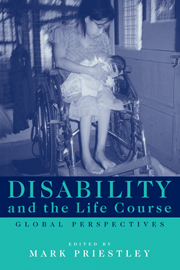Book contents
- Frontmatter
- Contents
- List of figures
- List of tables
- Notes on contributors
- Preface
- Acknowledgements
- A brief note on terminology
- I Concepts
- II Methods and stories
- III The politics of transition
- 13 Disabled children: an emergency submerged
- 14 Failing to make the transition? Theorising the ‘transition to adulthood’ for young disabled people
- 15 Breaking my head in the prime of my life: acquired disability in young adulthood
- 16 Work and adulthood: economic survival in the majority world
- 17 The possibility of choice: women with intellectual disabilities talk about having children
- 18 Ageing with disability in Japan
- 19 Ageing with intellectual disabilities; discovering disability with old age: same or different?
- 20 Epilogue
- Index
14 - Failing to make the transition? Theorising the ‘transition to adulthood’ for young disabled people
Published online by Cambridge University Press: 30 September 2009
- Frontmatter
- Contents
- List of figures
- List of tables
- Notes on contributors
- Preface
- Acknowledgements
- A brief note on terminology
- I Concepts
- II Methods and stories
- III The politics of transition
- 13 Disabled children: an emergency submerged
- 14 Failing to make the transition? Theorising the ‘transition to adulthood’ for young disabled people
- 15 Breaking my head in the prime of my life: acquired disability in young adulthood
- 16 Work and adulthood: economic survival in the majority world
- 17 The possibility of choice: women with intellectual disabilities talk about having children
- 18 Ageing with disability in Japan
- 19 Ageing with intellectual disabilities; discovering disability with old age: same or different?
- 20 Epilogue
- Index
Summary
In 1978, the vastly influential Warnock Report (1978) on special educational needs in Britain recognised the difficulties that many young disabled people faced when they left school. And it is within the special needs literature that discussions of the ‘transitional problem’ have tended to remain.
While the disability studies literature in the UK has increasingly applied its ‘social model’ (and its modifications) to children's education, the social model has far less frequently been applied to policies and theories around the life course (with some exceptions: e.g. Priestley 1999, 2000) and particularly to young people in transition. Similarly, the rich theorisation and research on the transition for young disabled people has been virtually ignored in the literature on young people more generally (again, with some exceptions: e.g., Coles 1995). For example, only recently has the youth field moved from a preoccupation with the transition from school to work – with little recognition of the decades of intense and extensive debates about what should constitute ‘adulthood’ in the transition literature for disabled people. Those in the youth field who have moved beyond the straight transition from school to work tend to present a transition from dependence to independence. Scant consideration is paid to the debate around ‘dependency’ in the disability studies literature or the ever-growing literature on children's rights and the sociology of childhood.
- Type
- Chapter
- Information
- Disability and the Life CourseGlobal Perspectives, pp. 167 - 178Publisher: Cambridge University PressPrint publication year: 2001
- 5
- Cited by



